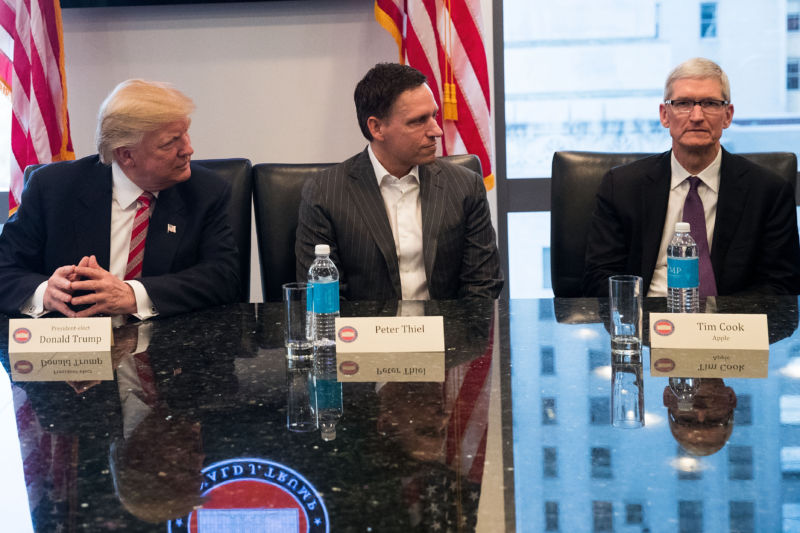
The firms are now adding their support to a fast-moving lawsuit, State of Washington v. Trump, to halt the recent executive order that placed new immigration restrictions on people from seven Muslim-majority nations. That list includes Iran, Iraq, Syria, Yemen, Somalia, Sudan, and Libya.
On Friday in federal court in Seattle, US District Judge James L. Robart ruled against the government, finding that a temporary restraining order was warranted and that the president overstepped his bounds. For now, the Seattle judge’s nationwide ruling stands. Late Saturday night, the 9th Circuit rejected the government’s attempt to get an emergency stay of the order.
In the Sunday night 53-page amicus filing, the corporations forcefully argued in favor of America’s history as a "nation of immigrants," and noted that if the order is allowed to stand, "American workers and the economy will suffer as a result." Many, but not all, of these companies also filed a amicus brief in Apple's 2016 showdown against the Department of Justice over a seized iPhone in San Bernardino, California.The Sunday filing came less than two months after high-level executives from several tech companies, including Apple CEO Tim Cook, attended a "summit" with the then-president-elect at Trump Tower in New York.
According to earlier reporting by the Seattle Times, over 21,000 Washington residents were born in Somalia, Iran, Iraq, Sudan, Syria, Libya, and Yemen. In court filings, state lawyers said that over 7,000 state residents were affected by the ban.
Earlier on Friday, government lawyers in a related case in Virginia said that at least 60,000 and possibly as many as 100,000 people have had their visas revoked as a result of the executive order.
"Considerable uncertainty"
The brief begins with an outline with a practical argument more so than a legal one, pointing out the country’s recent history of immigration, and speculates that companies will be harmed under the travel ban.
As lawyers for the tech companies write:
This instability and uncertainty will make it far more difficult and expensive for U.S. companies to hire some of the world’s best talent—and impede them from competing in the global marketplace. Businesses and employees have little incentive to go through the laborious process of sponsoring or obtaining a visa, and relocating to the United States, if an employee may be unexpectedly halted at the border. Skilled individuals will not wish to immigrate to the country if they may be cut off without warning from their spouses, grandparents, relatives, and friends—they will not pull up roots, incur significant economic risk, and subject their family to considerable uncertainty to immigrate to the United States in the face of this instability.
It then goes on to tackle specific legal arguments, notably that because the order discriminates based on nationality, it runs afoul of a 1965 federal law that prohibits just that. One of the key legal questions to be resolved is whether this law takes precedence over the president’s ability to secure the borders, and largely single-handedly determine immigration policy.
State of Washington is reminiscent of a recent case, United States v. Texas, where the Lone Star State challenged then-President Barack Obama’s Deferred Action for Parents of Americans (DAPA) program. Texas proved victorious at the district court level, and at the 5th US Circuit Court of Appeals. Last year, when the government tried to take the case up to the Supreme Court, it split 4-4, which allowed the lower court’s injunction to halt DAPA to go forward.
However, the 5th Circuit’s holding in Texas is not binding on the 9th Circuit, which now must adjudicate the dispute in State of Washington, which has quickly become the lode star legal case out of the over 15 nationwide pending lawsuits against the executive order.
"A doctrine rooted in racism"
The tech companies' amicus brief was filed along with two others, one from a group of immigration law professors, and another from the Fred Korematsu Center for Law and Equality.
The Korematsu Center, which is affiliated with the Seattle University School of Law, is named after Fred Korematsu, an influential Japanese-American man from Oakland, California who became a notable legal activist.
In 1942, during the WWII-era Japanese internment camps (which was instituted as the result of an executive order signed by President Franklin D. Roosevelt), Korematsu refused to report to the camps and was arrested. The American Civil Liberties Union took his case as a way to challenge the Roosevelt Administration’s policy, and the case went up to the Supreme Court, which in 1944, found in favor of the government.
However, while Korematsu lost the case, President Gerald Ford formally apologized for interment in 1976. Korematsu’s original conviction was overturned in district court in San Francisco in 1983, however the Supreme Court decision remains on the books.
The Korematsu Center rejected the government’s argument that the executive branch has a plenary, or unlimited, power to determine immigration policy. The group likened the plenary power doctrine to a “relic of an odious past,” comparing it to the “separate but equal” doctrine in public education that lasted until 1954.
As the group concludes:
History would look similarly at this case and this Court if it allows the Executive Order to evade review. Relying on the plenary power doctrine, a doctrine rooted in racism and xenophobia, to permit the Executive Order to stand will be seen for what it is—the judiciary’s abdication of its duty to stand as a bulwark against those who would undermine our core constitutional principles.
reader comments
297